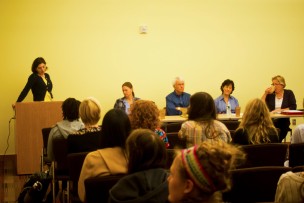
Leigh Stewart/Staff Photographer
This past Tuesday, the Wesleyan for Real Ethical Sustainable Habits (WesFRESH) Speaker Series kicked off with a four-person panel about the growing global food movement. The four speakers shared their diverse experiences and perspectives on food politics issues taking place in Connecticut and on a national scale.
“The food movement has gotten huge in the past few years,” said Mark Winne, author of “Closing the Food Gap.’” “It can be like herding cats to get effective coordinating. If you want to support a food system that is sustainable, you need the three Ps: projects, partners, and policies.”
Winne, former Executive Director of the Hartford Food System, spoke specifically about issues of food access within Connecticut. In 1985 he helped to start the first farmers market in Hartford and then started a farmers market incentive program in 1986, which allowed low-income families to use food stamps for fresh fruits and vegetables.
“Connecticut is the wealthiest state in the union but also houses some of the poorest cities in the country,” said Lucy Nolan, the Executive Director of End Hunger CT. “There are 300,000 people in Connecticut getting [food stamp] benefits, and 20 percent of families with kids have food hardship, meaning that they do not know where their food is coming from.”
Nolan spoke about the work she is concluding on a state-based level and how that was connected to projects in Middletown.
“The free summer lunch program is especially strong in Middletown and allows students who are on free or reduced lunch during school to get a free meal during the summer,” Nolan said. “Previously, these students would hate when summer started because they wouldn’t know when their next meal was coming.”
Courtney Fullilove, Assistant Professor of History and the moderator of the event, encouraged students to get involved in food issues beyond the University.
“Wesleyan is an institution within a community,” Fullilove said. “Policy isn’t something you can’t participate in until you graduate from college.”
Roberta Friedman, the Policy Director at Yale’s Rudd Center for Food Policy and Obesity Research, spoke about her impact on public policy through strategic science research.
“As a policy person, I take all of this research and translate it into speakable language to use in public policy,” Friedman said. “It’s a lot of fun. I get to fight the industry all the time.”
Friedman has been working on the problems with soda and combating the sugar-sweetened beverages industry that target children.
“With sugar-sweetened beverages, we have shown through our research that if you increase the price of soda by 10 percent you decrease consumption by the same amount,” Friedman said. “Soda is the number one major contributor to obesity in the country. One doctor recently came to me with complaints that a top contributor to the American Doctors Association is Coca-Cola. How can that be allowed?”
Throughout the panel, the speakers continued to bring up the importance of public policy in the food movement.
“Public policy is an intoxicating chess game,” said Jiff Martin from the Sustainable Food Systems, a University of Connecticut extension. “If you are interested in it, go for it. It’s not as hard to change policy as you think it is. People have gravitated towards the wrong issues rather than going to issues where you can actually make things happen. By focusing on small parts of policy it is easier to bring about change.”
Martin spoke about her work in bringing educational opportunities to the public around sustainable food systems and Master Gardener programs. She is working on the Working Lands Alliance, which is a farmland preservation coalition that aids farmers in the process of leasing land.
“Instead of worrying about issues like the huge subsidy programs in the upcoming farm bill, focus on small pilot programs that can bring about incremental changes,” Martin said.
Nolan agreed that people have been concentrating on the wrong aspect of the food industry.
“People focus on subsidies because most of the money of the farm bill is focused there,” she said. “But if you start small it is easier to work in a coalition with people.”
Caitlin Aylward ’13 organized the panel with WesFRESH because she wanted to provide a speaker series for people interested in food politics and sustainability.
“I’ve noticed an emerging community of food activists on campus lately and I’ve been really interested in getting more institutional support for the greenhouse, Long Lane, and WesFRESH,” Aylward said. “All of these movements on campus are working towards more sustainable food and food justice. I think that having a speaker series and getting the COE and other academic departments involved is an effective way of getting that started.”
The WesFRESH speaker series is continuing next Tuesday with a talk from Josh Viertel, the President of Slow Food USA.